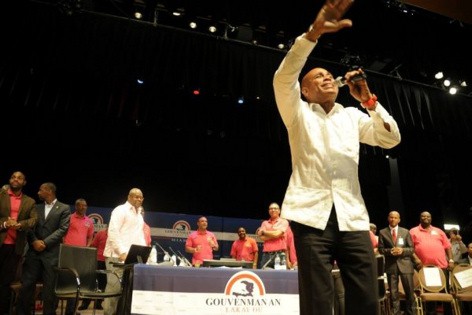U.S.-Bahamas Counternarcotics held joint task force conference
NASSAU, The Bahamas – On Thursday December 14, representatives of the Government of the Commonwealth of The Bahamas and the Government of the United States of America held their annual meeting of the Narcotics Joint Task Force at the Ministry of Foreign Affairs on East Hill Street.
The meeting was co-chaired by the Minister of Foreign Affairs and the Public Service, the Honorable Fred Mitchell, who led the Bahamian delegation, and U.S. Ambassador, John Darrell Rood, who headed the United States delegation.
The Joint Task Force has been meeting regularly since 1987. It is a forum for senior United States, Bahamian and Turks and Caicos officials to review joint operations, candidly discuss and assess future joint counter-narcotics efforts, and collaborate on ways to further strengthen the already close partnership that exists between the United States and The Bahamas in combating the flow of illegal drugs and migrants.
During the meeting, all sides engaged in a constructive and detailed discussion of their joint counter-narcotics efforts over the past year and exchanged ideas about additional steps that could be taken to improve the efficiency and effectiveness of their national and common efforts.
Bahamian and U.S. officials agreed that significant success had been achieved in interdicting illegal drug flows and in disrupting drug trafficking organizations.
Minister Mitchell, in his opening remarks, noted that this Joint Drug Task Force meeting was likely to be the last one in which Ambassador Rood would participate in before he demitted office. On behalf of the Government of The Bahamas, he thanked the Ambassador for his work in The Bahamas, which, the Minister stated, was conducted with aplomb.
An official welcome to the JTF meeting, was extended to recently appointed Commander of the Royal Bahamas Defence Force, Commodore Clifford Scavella, and to Superintendent Rodney Adams of the Turks & Caicos Police Force. An expression of thanks was also extended to former Commodore Davy Rolle for the work which he had done.
The Foreign Minister observed the continued commitment of both countries to the fight against illegal drugs. He expressed the need for “eternal vigilance” and called for the necessary resources to be put behind the fight.
He noted further that retrenchment was not an option, and alluded to the work being done by the Inter-American Drug Abuse Control Commission (CICAD), to encourage the sharing of technical and financial resources amongst member states of the hemisphere.
Minister Mitchell stated that the establishment of a Base at Inagua was under active consideration. So, too, is the upgrade and procurement of equipment for both the Police and the Defence Force.
The National Anti-Drug Secretariat and other law enforcement sections falling under the auspices of the Ministry of National Security have been relocated to Church House and were all in the process of becoming fully activated.
Ambassador Rood confirmed that this would be his final JTF meeting and thanked Minister Mitchell, the Bahamian government and the government of the Turks and Caicos for their efforts. He congratulated the Bahamian government on its recent decision to provide training to members of the Haitian National Police and noted that in the past few years Haiti has become a major transshipment point for cocaine from South America. The Ambassador mentioned that experts estimate that sixty metric tons of cocaine entered Haiti last year and that common sense and seizure statistics tell us that Haiti is not the ultimate destination for this contraband.
He noted that the Bahamas corridor provides the shortest and quickest path for cocaine coming from Haiti to reach the United States, adding that anything our governments can do to strengthen the law enforcement capacity of the Haitian government will directly benefit our common efforts to fight narcotics trafficking in the Bahamas and in the United States.
The Ambassador emphasized the continued strong commitment of the United Stats to OPBAT.
Despite the potential withdrawal of U.S. Army air assets from the OPBAT mission, he reaffirmed that the United States was determined to ensure that OPBAT retained or strengthened its current capabilities. The US Government is assessing the best possible alternatives to Army support nd wwill make a determination early in the New Year.
Ambassador Rood acknowledged that American demand for illegal drugs helps fuel the narcotics trade and underscored the United States commitment to drug prevention and treatment programs. To counter this demand, he pointed out that forty percent of the United States government’s counter-narcotics spending, some $4.5 billion, goes towards prevention and treatment, and that state and local governments spend similar sums for treatment and prevention.
The Ambassador urged all participants to maintain their commitment to fight against illegal narcotics and challenged them to expand the sophistication and effectiveness of bilateral efforts to successfully confront the challenges posed by traffickers in the new century.
The Ambassador expressed appreciation for the continued high priority that the Government of the Bahamas accords fighting illegal drug consumption, the interdiction of illegal drugs transiting, and its drug education campaign in The Bahamas.
The Minister reaffirmed The Bahamas’ commitment to the fight against drugs, and stated that although by next year December, an election would have been held, the commitment to this fight transcended politics and was truly bi-partisan in nature.
The two Parties agreed that next Joint Task Force meeting would take place next summer in a similar time frame.

